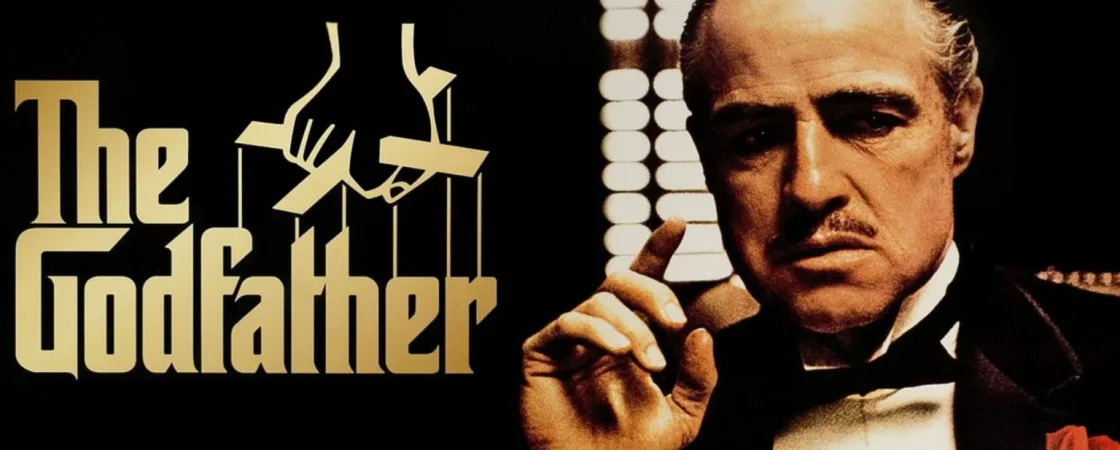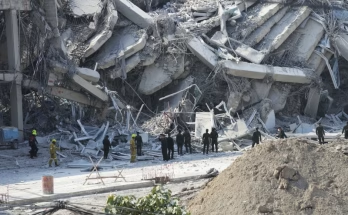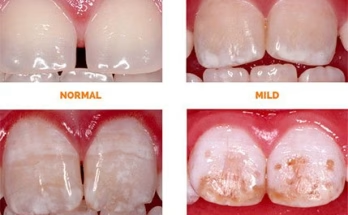“The Godfather” (1972) is a landmark crime film directed by Francis Ford Coppola, adapted from Mario Puzo’s novel of the same name. Starring Marlon Brando, Al Pacino, James Caan, Robert Duvall, and Diane Keaton, The Godfather is widely regarded as one of the greatest films in cinematic history. It chronicles the lives of the powerful Corleone crime family, exploring themes of power, loyalty, betrayal, and the dark realities of organized crime. The film is known for its compelling storytelling, complex characters, and unforgettable scenes, solidifying its legacy as a masterpiece.
Plot Summary
The story begins in 1945, following Vito Corleone (Marlon Brando), the aging patriarch of the Corleone family and head of one of New York’s most powerful Mafia families. Vito is a man who values loyalty, family, and honor, ruling his world with a mixture of compassion and ruthlessness. When a heroin dealer named Sollozzo seeks the Corleone family’s assistance in drug trafficking, Vito refuses, wary of the influence drugs would bring. Sollozzo’s rejection leads to a bloody conflict that changes the lives of the Corleones forever.
After an assassination attempt on Vito leaves him severely injured, his sons Sonny (James Caan), Michael (Al Pacino), and Fredo (John Cazale) each react differently to the situation. Michael, a former Marine who had hoped to distance himself from the family’s criminal activities, steps up to protect his father and ends up killing two men responsible for the attack. This act forces him into hiding in Sicily, where he eventually marries and loses his wife in a targeted explosion.
As the Corleones work to consolidate their power and survive in the ever-dangerous world of organized crime, Michael transforms into a ruthless leader, taking over as head of the family from his ailing father. The film’s climax shows Michael systematically eliminating his enemies and any threats to his power, marking his full transformation into the new Don of the Corleone family.
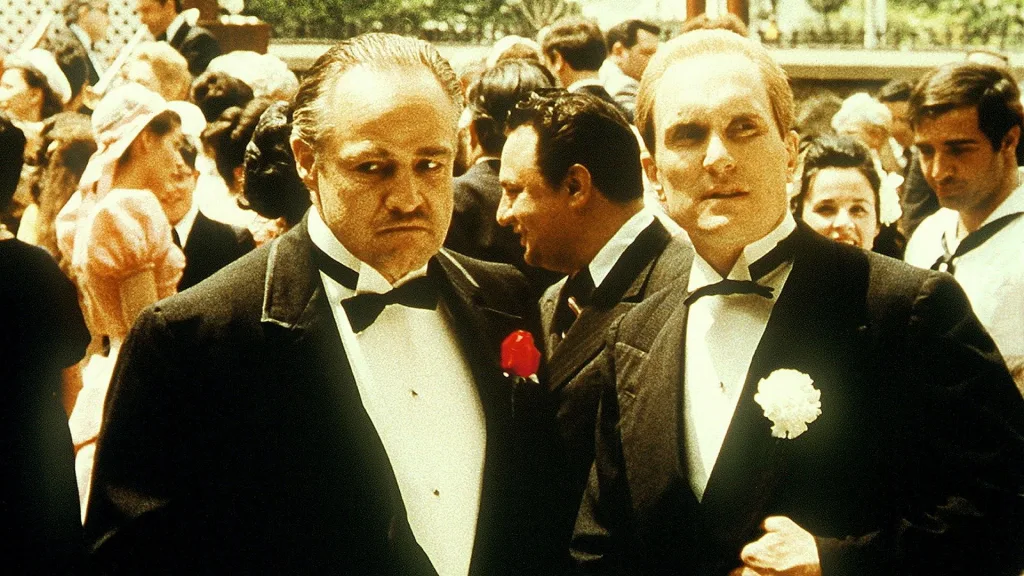
Key Themes
- Power and Corruption: The Godfather examines the corrupting influence of power, showing how even family loyalty can be compromised by the pursuit of control.
- Family and Loyalty: The Corleone family’s devotion to each other is central, but it is complicated by betrayal and difficult choices that test their loyalty to both family and the “business.”
- Identity and Transformation: Michael’s journey from a reluctant family member to a powerful crime boss is a critical focus, highlighting how circumstances and choices can drastically alter one’s identity.
- Honor and Morality: The film raises questions about honor in a morally ambiguous world, where lines between right and wrong are often blurred.
Iconic Scenes and Quotes
The Godfather is filled with iconic moments, from Vito’s opening line, “I’m gonna make him an offer he can’t refuse,” to the unforgettable baptism sequence where Michael consolidates power through a series of brutal assassinations. The horse head in the bed, Sonny’s ambush at the tollbooth, and Vito’s quiet passing in the garden are some of the most memorable scenes in cinematic history.
Performances and Characters
- Marlon Brando as Vito Corleone: Brando’s portrayal of Vito is legendary, bringing depth, humanity, and menace to the role. His performance won him an Academy Award for Best Actor.
- Al Pacino as Michael Corleone: Pacino’s nuanced performance captures Michael’s transformation from an innocent outsider to a hardened Mafia boss. His journey is central to the film’s emotional and thematic depth.
- James Caan as Sonny Corleone: Caan’s portrayal of the hot-headed and passionate Sonny adds both tension and pathos to the family dynamic.
- Robert Duvall as Tom Hagen: Duvall’s quiet, steadfast portrayal of the Corleone family’s consigliere provides a steady, loyal presence.
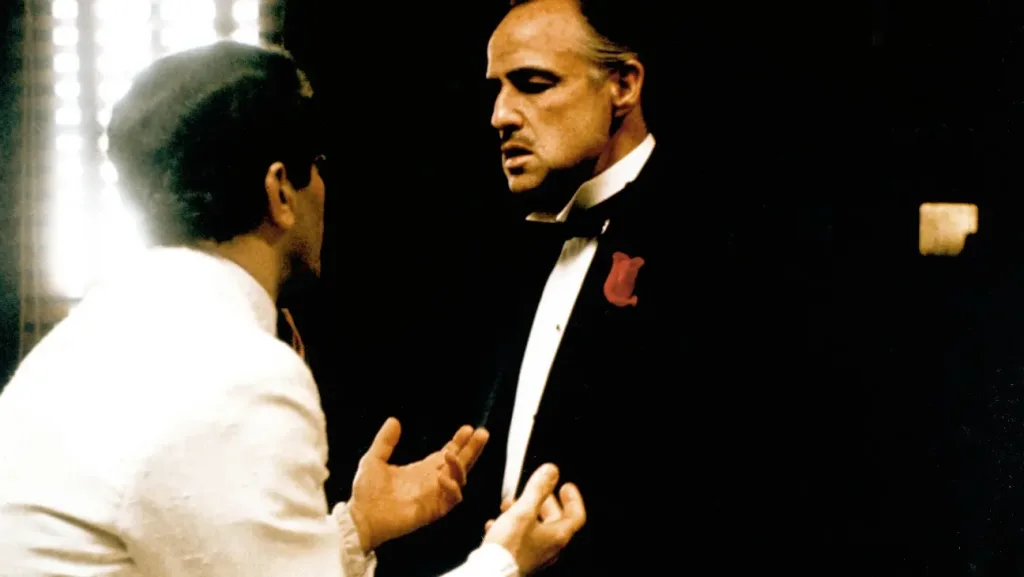
Cinematography and Style
Cinematographer Gordon Willis, known as the “Prince of Darkness,” used deep shadows and warm lighting to create the film’s iconic look. The film’s cinematography captures both the opulence and the grim reality of Mafia life, with carefully composed shots that evoke an atmosphere of elegance and menace. The haunting score by Nino Rota, with its unforgettable main theme, deepens the emotional resonance and dramatic intensity of the film.
Reception and Legacy
The Godfather was a critical and commercial success, becoming the highest-grossing film of its time and winning three Academy Awards, including Best Picture, Best Actor (Marlon Brando), and Best Adapted Screenplay. The film received universal acclaim, praised for its rich storytelling, powerful performances, and masterful direction. It is considered one of the greatest films ever made, ranking highly on numerous “best films” lists.
The Godfather also influenced countless films, television shows, and books, setting the standard for crime dramas and shaping the way Mafia stories are portrayed in media. Its impact on pop culture is immense, and phrases like “offer he can’t refuse” have become part of the cultural lexicon.
Cast and Crew
- Director: Francis Ford Coppola
- Writers: Mario Puzo (novel), Mario Puzo and Francis Ford Coppola (screenplay)
- Cast:
- Marlon Brando as Vito Corleone
- Al Pacino as Michael Corleone
- James Caan as Sonny Corleone
- Robert Duvall as Tom Hagen
- Diane Keaton as Kay Adams
- John Cazale as Fredo Corleone
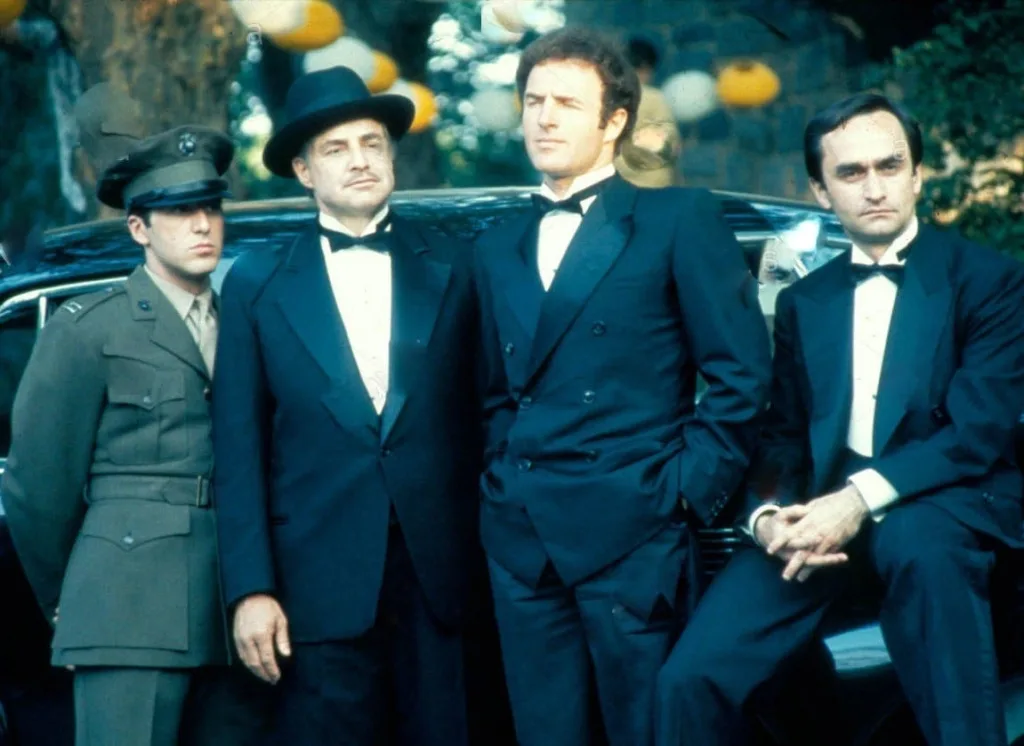
Fun Facts
- Marlon Brando famously used cotton balls in his cheeks during his audition to create Vito’s distinctive jawline.
- The Godfather was initially met with controversy from Italian-American groups, but it has since become one of the most revered portrayals of the Mafia.
- The wedding scene at the beginning of the film was filmed with real Italian-Americans from the neighborhood to add authenticity.
Conclusion
The Godfather is a timeless masterpiece that transcends the crime genre, exploring themes of power, family, and morality with a depth and sophistication that few films achieve. Its unforgettable characters, complex narrative, and masterful direction have cemented its place in film history as an enduring work of art. To this day, The Godfather remains a powerful exploration of family loyalty and the heavy costs of ambition, power, and revenge.
